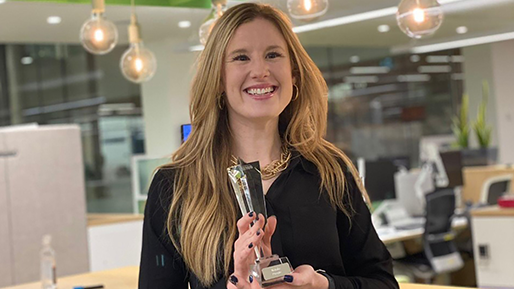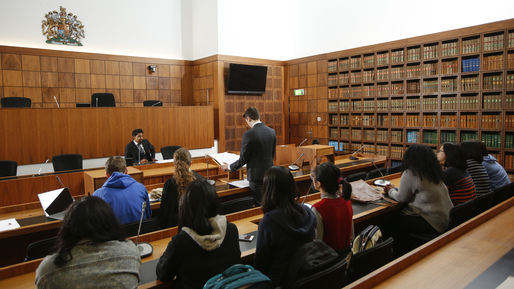
Bachelor of Laws LLB (Hons)
Our LLB Law degree is the first step to becoming a solicitor or barrister. Legally experienced lecturers bring law to life with interactive teaching, ensuring an engaging learning experience that helps you achieve your career ambitions.
-
Typical offer: 120−128
Entry requirements -
Fees: £9,535 per year (UK)
Full details -
UCAS code: M100
-
Course length: Various
Find out more -
Location:
- University of Hertfordshire, Hatfield
-
Institute code: H36
-
Work placement option
Find out more -
Study abroad option
Find out more
Course overview
The interactive teaching approach of the LLB Law programme equips you for the legal profession with small class sizes, expert guidance and flexible learning options - you can attend lectures live or stream them anytime. Gain hands-on experience through our award-winning Pro Bono Law Clinic, working with experienced lawyers to build key skills and industry connections. You will be taught by a diverse team of academics, solicitors, barristers and a judge, providing you with a deep understanding of how to apply the law. With inspiring guest speakers, networking events and career support, you’ll be part of the legal community from day one, setting the foundation for a successful career.
Why choose this course?
Immersive and Practical Learning
LLB Law at Herts gives you hands-on experience to develop real-world legal skills. Through practical exercises, critical legal thinking, and immersive environments like our full-scale replica Crown Court, you’ll build the confidence to navigate legal proceedings. You’ll have access to a range of opportunities, including pro bono work, co-curricular activities and Qualified Work Experience (QWE), all helping to strengthen your CV, improve your employability and give you insight into different areas of law. These experiences let you apply your knowledge in real settings and stand out in a competitive job market.
Real-World Experience and Employability
We have strong links with both regional firms and leading London law firms, including Slaughter and May, Freshfields Bruckhaus Deringer and Clifford Chance. These partnerships open up valuable career opportunities and enable you to engage with experienced legal professionals throughout your studies. You’ll benefit from exclusive events such as Law Fairs, employer-led workshops, and networking sessions. giving you the chance to build connections, gain industry insight and explore potential career paths within the legal sector.
Personalised Learning and Career Progression
The programme is designed to suit your individual goals, offering a wide range of optional modules, available as both 15- and 30-credit options for greater flexibility. This personalised approach prepares you for further postgraduate training as a solicitor or barrister and supports your long-term career development.
Professional accreditations
Chartered Institute of Legal Executives (CILEX)
The LLB programme has received an Institutional Exemption from the Chartered Institute of Legal Executives (CILEX) level 6 qualifications. Upon successful completion of the LLB (including completion of the following modules: Land Law, Company Law and Litigation) you will be eligible to apply for exemptions from CILEX Level 6 Diploma in Law and Practice and CILEX Graduate Fast Track Diploma (CILEX Level 6 Diploma in Legal Practice).
You'll also be able to apply to CILEX to become a Graduate Member (for a fee). Graduate members will therefore not be required to undertake a Legal Practice Course or a Training Contract, and can instead enter the legal profession ahead of their peers. Find out further benefits of the CILEx membership.
Your future career
If your career aspiration is to be a solicitor or barrister in the UK, LLB Law at Herts will prepare you in part for the Solicitors Qualifying Examination (SQE1) or Bar Practice Course (to qualify as a barrister).
You may find employment in legal firms, local and national government, civil society organisations, and make a real difference. Law graduates typically find employment in the following roles:
- solicitor
- barrister
- paralegal
- in-house council
- government and public sector roles
- mediator/arbitrator.
With our pro bono activities, you will gain work experience as you get involved in offering real legal advice to people in need. Our students have worked with: Centre Point, Future Living Hertford, Red Kite, Herts Domestic Abuse Helpline, CDA Herts.
See what recent graduates are up to

Natalie Pringle
Start-up Programme Manager at CMS UK
Meet Natalie Pringle who has excelled in a varied career based across the UK and SE Asia. Natalie is listed in the 2021 TechWomen100 Awards and supports start-ups in the tech space through an accelerator programme run by international law firm, CMS.
Career Successes
Natalie is listed in the highly prestigious 2021 TechWomen100 Awards. These awards highlight remarkable women within the technology and STEM sector, and Natalie has been recognised for the technology focussed business start-up accelerator programme she runs at global law firm CMS. This programme provides legal advice, training, mentoring, and networking for clients all over the world, focussed on different markets. Natalie also offers thought leadership and speaks at industry events focusing on empowering women in technology.
Talking about the award Natalie said, 'I’m incredibly honoured to have been featured as a TechWomen100 and recognised by these prestigious awards. Run by the WeAreTechWomen team, the awards consistently feature the brightest stars and trailblazers in the tech industry, and it is a huge privilege to be included amongst them.'
Prior to joining CMS, Natalie was working in Asia and made the move when invited to establish the Hong Kong office of a London based real estate firm. This later led to her establishing her own property investment company which assisted clients throughout SE Asia. She also launched a division of The New Savvy, a financial investments and career platform in Asia, dedicated to helping women improve their financial wellbeing and raising awareness of the importance of financial literacy.
In addition to this she managed a programme for Hong Kong based Splash Foundation, which empowers individuals in under-resourced communities through swimming.
Natalie’s memories of Herts
Natalie took full advantage of the opportunities on offer within Hertfordshire Law School including extra-curricular activities like mooting, debating, trips to Inns of Court, as well as attending talks from guest speakers. She says, ‘These opportunities helped me gain confidence and have shaped the person I am now. This experience helped me to see that if you are willing to put your time and commitment, then many other doors will open for you.’
Her favourite extra-curricular activity was being involved in the mooting team as she competed across the UK. She says, ‘The skills I learnt while on the mooting team are invaluable and the overall experience was fantastic. These experiences have been extremely beneficial throughout my career and provided me with the knowledge and confidence to speak in public, research and shape a legal argument.’

Chelsie Osborne
Youth Violence Caseworker at Accident and Emergency Department
Meet Chelsie. Chelsie is using what she learnt on her course to help young people turn their lives around.
Makin an Impact
Chelsie was interested in how crime impacts society and why people commit crime - she knew she wanted to pursue a career in the criminal justice system. Herts had the right course for her, BA (Hons) Criminal Justice and Criminology, and the campus was easy to travel to from home. As Chelsie says, ‘The course looked at the different aspects of crime and the reasons behind it. We considered people's different characteristics, such as their age or gender. I also enjoyed learning about victimology and the impact of crime too.’
‘In my role as a Youth Violence Caseworker in an A&E department, I use what I learnt on the course to better understand the different factors that lead people to commit crime. This means I can help young people more effectively by having meaningful discussions with them about their life choices, reasons for their actions, and the potential consequences of them. I know I am making a big difference and it’s great to be able to help young people make positive lifestyle changes, whether that’s with their education, employment, or housing.’
Chelsie wants to continue developing in her career and has ambitions to support the rehabilitation of offenders. She says, ‘I want to be part of shaping what rehabilitation in prisons looks like, as I don’t feel we are doing enough to help people with a custodial sentence make positive changes to their lives. Currently, we approach it as if ‘one size fits all’, but I believe this type of support should be more holistic.’
Her advice
One of Chelsie’s favourite experiences at Herts was Freshers’ Week and other events held on campus during her studies. Whilst she encourages current and future students to work hard, she adds, ‘Don’t forget to have fun along the way. University is what you make of it, so take the opportunities you get and make great memories.’

Anwar 'Ash' Khan
Lawyer at British American Tobacco
Meet Anwar 'Ash' Khan who since graduating in 2010 has taken all of the opportunities presented to him.
Opportunities and experiences
Anwar credits his professional success to having had the opportunity to gain experience in both private practice and in-house legal counsel roles. He recognises the role the University of Hertfordshire has played in getting him to where he is today having studied Law at the University.
Throughout his degree, he learnt the importance of independent study but also the value of the group study exercises. These practical elements enabled him to learn and hone his research and communication skills in public as well as in a client advisory role.
Anwar speaks highly of the resources on offer and the academic staff who he says were always available to offer support. 'My lecturers supported me to tackle tricky subjects or areas which I had difficulty in improving on. I was never too great at coursework, but with their expertise and guidance, I was able to tailor my writing style to address key points in my coursework.'
Anwar's experience at the University was enhanced by the strong student community present on campus. He says, 'I stay in contact with many of my friends from university. Some have even offered me guidance and have helped with interview advice and roles following my degree. Some of my friends also went on to study the LPC as well.'
Aspirations for the future
He has been successful in achieving his career aspirations, capitalising on the support and opportunities his degree offered. He advises new and prospective students to do the same: 'Try your best. Don't have a fixed idea on what happens after graduation. Your opportunities are limitless. The skills you learn are made for the professional world. Take every professional opportunity available and make the best of the great staff there to advise you.'
Looking ahead, Anwar is excited for the next stage of his career but remains committed to doing more charity work. He recently carried out philanthropic work in Bangladesh and hopes to do more to help third world countries in the future.
What you'll study
In your first year, you’ll establish a robust foundation of legal knowledge and professional skills. Explore key areas such as Contract Law, Tort Actions, Justice Matters, and the Constitutional Principles of the UK and EU. Our innovative employability module, Life in the Law, integrates career development into the core of your LLB experience.
From day one, you'll get hands-on practice in our replica Crown Court, presenting client arguments in front of a judge.
Your second year delves into land law, criminal law, equity, and the law of trusts. The Life in the Law II module focuses on career and personal development, preparing you for the professional world. Participate in our mock assessment centre to develop real-world skills in a supportive environment.
As the year progresses you will begin to tailor your studies by selecting a 15-credit module from options such as Commercial Law, Street Law, Practical Legal Skills (introduction to SQE 2 skills), Law of Digital Economy, or Law of Local Government.
Participate in our award-winning Pro Bono Law Clinic, gaining practical experience while providing legal advice to the local community.
In your final year, with the foundational knowledge in place, you’ll have the opportunity to specialise in the areas that ignite your passion. Choose from over 20 specialist subjects, ranging from international environmental law to cybercrime. Consider modules like Trial Advocacy or Clinical Legal Education to further hone your skills and expertise.
What if I need support?
At Herts, we’re committed to your success with personalised support throughout your studies. Your dedicated Academic Support Tutor and approachable course leaders ensure guidance at every step.
For personal wellbeing, our Student Wellbeing Service and trained mental health first aiders offer care, alongside a 24/7 helpline and a free counselling app.
Enhance your academic skills with free workshops, one-on-one sessions, and online tutorials. Our Learning Resources Centres provide drop-in study skills sessions for extra support.
We champion neurodiversity in law, offering tailored assistance, pre-classroom tours, online seminar materials, and exam adjustments to support all learning needs.
Optional sandwich year
Enhance your learning with an optional work placement year, typically between your second and third year of study, where you can apply your legal skills in real-world settings, gain valuable experience, and make a direct impact in your field of interest. You will pay no tuition fee during this sandwich year.
Our Career and Employment service will support you in exploring your options and make valuable contacts for your future career.
Broaden your horizons with an optional study abroad year, gaining international perspectives and diverse experiences that will enrich your legal education and prepare you to address global challenges.
Stand out from the crowd and experience living abroad. The University of Hertfordshire partners with over 150 universities around the world across all continents.
If you study abroad between your second and third year you will pay no tuition feed to the partner university or to us. We will ask you to make your decision in your second year, so you have plenty of time to think of where you want to go!
Enhance your learning with an optional work placement year, typically between your second and third year of study, where you can apply your legal skills in real-world settings, gain valuable experience, and make a direct impact in your field of interest. You will pay no tuition fee during this sandwich year.
Our Career and Employment service will support you in exploring your options and make valuable contacts for your future career.
Find out more about work placementsBroaden your horizons with an optional study abroad year, gaining international perspectives and diverse experiences that will enrich your legal education and prepare you to address global challenges.
Stand out from the crowd and experience living abroad. The University of Hertfordshire partners with over 150 universities around the world across all continents.
If you study abroad between your second and third year you will pay no tuition feed to the partner university or to us. We will ask you to make your decision in your second year, so you have plenty of time to think of where you want to go!
Find out more about study abroad optionsWhere you'll study
The Law School Building on de Havilland campus brings you a mixture of fantastic technology, well-equipped study spaces and realistic legal settings. Inside you’ll find our incredible replica Crown Court, complete with judge’s bench and viewing gallery, where you’ll practise your skills and build your confidence.
You’ll share this campus with students from business, law, sport, and education subjects. The student housing is close to our Sports Village which includes a gym, swimming pool and climbing wall.
You can get breakfast, lunch, or dinner in our on-campus restaurant or bar on days you don’t feel like cooking. You can also use the common room to play pool, video games or just to hang out with friends.Discover the Enterprise Hub, a vibrant destination where local firms and students work and learn in comfort.Our Learning Resources Centres are open 24/7, which means you can study whenever suits you best. Want to pop over to the other campus? You can take the free shuttle bus or walk there in just 15 minutes.
A train to central London takes just over 20 minutes, and you are also conveniently located on the A1(M) with access to the road network, making travel quick and convenient.
Who you'll learn from
Learn from a diverse team ranging from practicing lawyers and experts who bring real-world experience into the classroom, to academics engaged in cutting edge research. Their insights and mentorship will guide you as you develop practical and critical skills to transform your future and society. Learn more about your tutors here.
Check out our student blogs
How we support our students
At the University of Hertfordshire, we want to make sure your time studying with us is as stress-free and rewarding as possible.
We offer a range of support services, from childcare to counselling, ensuring that you make the most of your time at Herts and can focus on studying, having fun, and have the support you need.

Student Blogs
Nicole-Therese - Guide to law facilities
Guide to the law facilities
The de Havilland Campus situated at the crossroads of A1001 and A1087 in Hatfield Business Park is where everything relating to Law takes place.
There’s a separate building opposite the building where the Learning Resource Centre is situated called the Law Court Building. This Building is where a vast majority of my classes take place and where the mock Courtroom is located.
The Learning Resource Centre (LRC)
In the Learning Resource Centre (LRC), we have a whole sector just for Law textbooks and resources. Law requires a lot of reading, so this is essential while studying Law at university.
There are computers on each floor which you could use as well as laptops you can borrow, take home and use. There are quiet rooms as well to accommodate students who find it difficult to focus in a busy environment. There are also rooms where students can meet up to conduct group meetings for group assignments/ projects.
Online Library
The online library is very important for Law students and arguably the most useful resource while studying Law. You can search for things like textbooks, journal articles and eBooks. The online library also shows you what textbooks are available in hard copy at the LRC. There are also tools for legal database research available like Westlaw, Lexis Nexis and practical Law. There are also training sessions on how to use these resources.
Mock courtroom
The University has a £10 million Law Court building containing a full-scale courtroom which was voted the eight most impressive law school building in the world.
There are also Law Report books in the courtroom. I have also been to the courtroom for an important webinar and a domestic abuse training conference which took place there.
Career Hub / Hutton hub
The careers and employment service are on hand to help you on your way to future success in Law. There are people available to advise you on your cv layout, cover letters etc. They even provide training on how to ace a job interview.

Student Blogs
Temiladejesu - A week at a glance
A week in the life of a law student
Hello and welcome to my blog. Here, I will be giving you a glimpse into what a typical week in my life as a Law Student at the University of Hertfordshire looks like.
Choosing the University of Hertfordshire as my firm choice is one of the best decisions I have made. The university provides the flexibility to balance both my work and studies seamlessly.
Monday:
I usually wake up around 8 am and start my day with some prayers. After getting ready, I head out to the bus stop, which is conveniently located thanks to the university’s transportation measures. I reach the university around 10:40 am, just in time for my 11 am seminar.
I spent 20 minutes in the Learning Resource Centre preparing any useful questions I might have for the seminar. The seminar lasts for two hours, after which I grab lunch and use the rest of my free time to read or watch short movies on my phone. I prepare for two back-to-back seminars, each lasting an hour.
After my classes, I head back home, freshen up, eat dinner, and work on my coursework. I unwind by scrolling through TikTok and catching up with friends before calling it a day.
Biweekly Monday Volunteering
Every two weeks on Mondays, I volunteer with the school tasking project. I go to a primary school to teach year five Students the basics of law and create challenges to help them develop their teamwork and communication skills. This experience is incredibly rewarding as it allows me to share my passion for law and positively impact young minds.
Tuesday:
Tuesdays follow a similar routine to Mondays, but with a bit freer time, which I use in catching up with things that I have missed during lectures.
Wednesday:
Wednesdays are slightly different. I have two seminars starting at 9am and 11am. My tutor usually gives a short break between the session, allowing us to grab a snack and relax. After seminars, I catch the bus home and head straight to work. My shift ends around 11pm, though sometimes I stay a bit longer to help as a shift manager.
Thursday:
I wake up later Thursdays, due to the late shift on Wednesday. I do some house chores, eat my breakfast and prepare myself for the gym. I sometimes question myself whether it is right to eat right before going to the gym. Afterwards, I have my bath and prepare for work. There is usually a huge struggle getting the bus to work due to the busy peak hours (around 3:30pm when students finish their classes for the day).
Friday:
I volunteer on Fridays with Citizen’s Advice. I enjoy doing this. It also gives me the opportunity to gain real life experiences in law. I start at 10am. Immediately, I meet with my supervisor to assign me with clients for the day. I usually manage a minimum of two clients. I finish at 3pm, after which I head home for a late lunch. and call it a day. I get back home and have my late lunch. In the evening, I go to the gym in the evening and prepare for work the next day.
Saturday:
While Saturdays are fun for most, I spend my working. Balancing work and studies can be tough, but the support from the university and my friends helps me manage everything efficiently.
Sunday:
Sunday is my chill day where I get to do whatever I want. I attend church service from 11:30 am to 14:00 pm, which is usually one of the best experiences. After church, I go to the mall with my family. I assist my mum in preparing lunch. We enjoy the afternoon playing games and watching movies. In the evening, I get my cloths and necessities ready for the upcoming week.
As you can see, a typical week in my life is quite busy, but it is also rewarding. Not to worry, I ensure I get enough rest and take days off from work when necessary to maintain a decent work life balance.

Student Blogs
Temiladejesu - Misconceptions about studying law and the legal system
Misconceptions about studying Law
In this blog, I will be debunking some general misconceptions about the law. Some of these misconceptions I used to have, while others I have heard or read about from various sources, including people around me.
Here are a few:
Wearing black and white in University as a Law student: I used to think that all law students worldwide had to dress in white and black, especially because this is the usual practice in my home country. However, when I arrived in the UK, I discovered this was not the case, and we are allowed to wear whatever we feel comfortable in. while wearing black and white can provide a sense of formality and professionalism, having the option to wear what I feel comfortable in is quite good.
All lawyers are barristers: I often thought that anyone who studies the law automatically qualifies to represent a client in court. However, this is not true. Not everyone who works in the legal sector can represent a client in court; there are specific processes and qualifications needed. For instance, a solicitor can represent a client in court, but they must achieve the necessary qualifications. Therefore, not all legal professionals are barristers.
You can make a legal suit for anything: I often joke with my siblings about suing them, especially when they take my chocolates or any of my favourite snacks. However, we cannot take any case to court, especially one without substance. This is done to avoid a flood gate of cases and to ensure that the resources of the state are not spent on trivial matters.
All contracts must be written to be valid: Not all contracts need to be written to be valid, with the exception of the sale of land, which must always be in a written contract for validity. Verbal contracts are also valid, although they might be more difficult to prove. Regardless, the law recognises them.
You can sue an individual for an infringement over your right: Commonly, we think of human rights and assume that if an individual like ourselves stops us from expressing ourselves freely, we can sue them. This is not the case, as human rights infringement typically deals with public authorities. You can only make a claim when a member of the public authorities abuses their power and goes against your human rights.
Being a lawyer makes you so rich: Not all legal professionals start off by earning high salaries. In fact, pay depends on your level and the department you are in. An individual can earn as low as £20k. However, as a person progresses in the profession, their pay increases accordingly.
You may have heard about some of the misconceptions above. Let me know if you have more to add. I will be checking the comment section. Let us keep the fun going by adding our ideas.
Entry requirements
The University of Hertfordshire is committed to welcoming students with a wide range of qualifications and levels of experience. The entry requirements listed on the course pages provide a guide to the minimum level of qualifications needed to study each course. However, we have a flexible approach to admissions and each application will be considered on an individual basis.
| Typical offer (UCAS points) | 120−128 |
|---|---|
| Typical A Level offer | BBB−ABB |
| Typical IB offer | 120−128 |
| Typical BTEC offer | DDM |
| Accepted T Levels | Design Survey and Planning for Construction; Design Production, Design and Development; Education and Childcare; Healthcare Science; Health; Science; Digital Support Services; Digital Business Services; Onsite Construction; Building Services Engineering for Construction; Accounting; Design and Development for Engineering and Manufacturing; Engineering, Manufacturing, Processing and Control; Finance; Maintenance, Installation and Repair for Engineering and Manufacturing; Management and Administration; Agriculture, Land Management and Production; Legal Services |
| GCSE | Grade 4/C in English Language and Mathematics |
| Access courses | An overall merit profile in 45 credits at Level 3 |
| Additional information | Find out more about our standard and contextual Undergraduate Entry Requirements. |
| English language | All students from non-majority English speaking countries require proof of English language proficiency, equivalent to an overall IELTS score of 6.0 with a minimum of 5.5 in each band. If you do not have the required IELTS or equivalent for direct entry on to your degree programme, our Pre-sessional English and International Foundation courses can help you to achieve this level. |
|---|---|
| Additional information | Find out more about International Entry Requirements. |
Ready to apply?
UK and EU applicants with pre-settled/settled status in the UK
| Start date | Study type | Apply |
|---|---|---|
| January 2024 | Full time with placement year | Apply via UCAS |
| September 2024 | Full time | Apply via UCAS |
| Full time with placement year | Apply via UCAS | |
| Full time with study abroad year | Apply via UCAS | |
| Part time | Apply with Herts | |
| January 2025 | Full time with placement year | Apply via UCAS |
| September 2025 | Full time | Apply via UCAS |
| Full time with placement year | Apply via UCAS | |
| Full time with study abroad year | Apply via UCAS | |
| Part time | Apply with Herts | |
| January 2026 | Full time with placement year | Apply via UCAS |
International and EU applicants without pre-settled status in the UK
Fees and funding
At Herts, we’re dedicated to providing world-class teaching supported by industry-level facilities and incredible social spaces. We believe cost shouldn’t be a barrier to higher education, and we strive to keep both our standard and additional costs as low as possible.
| Study type | Fees | |
|---|---|---|
| UK students | Full time | £9,535 for the 2025/2026 academic year |
| Part time | £1,190 per 15 credits for the 2025/2026 academic year | |
| EU students | Full time | £15,965 for the 2025/2026 academic year |
| Part time | £1,995 per 15 credits for the 2025/2026 academic year | |
| International students | Full time | £15,965 for the 2025/2026 academic year |
| Part time | £1,995 per 15 credits for the 2025/2026 academic year |
Tuition fees are charged annually. The fees quoted above are for the specified year(s) only. Fees may be higher in future years, for both new and continuing students. Please see the University’s Fees and Finance Policy (and in particular the section headed “When tuition fees change”), for further information about when and by how much the University may increase its fees for future years.
| Scholarships, grants and bursaries | Depending on your circumstances, you may be eligible for a non-repayable scholarship, grant or bursary to support your studies. |
|---|---|
| Disabled Students' Allowance | The Disabled Students’ Allowance can cover any study-related costs you have because of a mental health problem, long term illness or any other disability. |
| Student loans | Find out about securing a student loan, from how much you could be eligible for to when you need to start making repayments. |
| Accommodation costs | We offer a great choice of student accommodation, on campus or nearby in the local area, to suit every student budget. |
| Additional course fees | Read more about additional fees in the course fact sheet. |
More about the course
| Course fact sheets | |
|---|---|
| Law Degree (LLB) | Download PDF |
| Programme specifications | |
|---|---|
| Law Degree (LLB) | Download PDF |
| Additional information | |
|---|---|
|
Applications open to international and EU students |
Yes |
Course length |
Full Time, 3 Years Part Time, 6 Years Sandwich, 4 Years |



